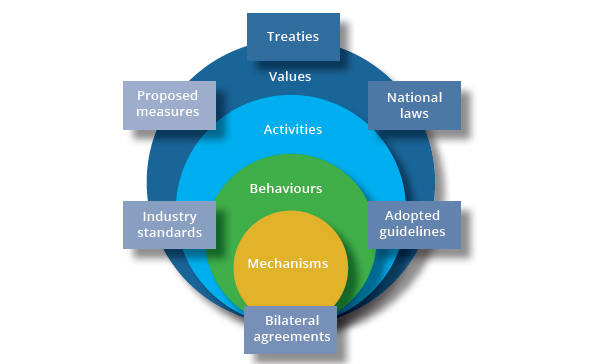Norms, space security, and arms control
Threats to the security of outer space are growing. More pronouncements that space is a warfighting domain are augmented by periodic accusations of, and demonstrations of, weapons tests. The latest research on global counterspace capabilities reveals an expanding and accelerating proliferation of capabilities that can target and harm objects in space.
Efforts to address these threats through traditional arms control methods under the mandate of the UN Conference on Disarmament (CD) – the multilateral body established to negotiate arms control and disarmament agreements – have been stalled for almost four decades by a series of political and technical obstacles.
What role could norms play to end this deadlock and preserve peace in outer space?
WHAT ARE NORMS?
Norms are broadly defined as rules of behaviour rooted in shared values and societal expectations of appropriate conduct. In other words, norms are based on a common understanding of what “good” behaviour means and impose a strong social and moral obligation to comply. While many norms are voluntary, they aren’t always; norms can be codified and form the basis of legal or other formal agreements.
Here, however, we will focus on voluntary norms—rules that are not legally enforced. These norms are still powerful shapers of behaviour. Those who abide by them are reputed to be good; those who do not can be called out for bad behaviour. The ability to identify and call out bad behaviour is a powerful driver of the growing interest in space security norms.
WHY DO NORMS MATTER FOR SPACE SECURITY?
Norms of behaviour are essential for maintaining order; they often fill in legal gaps and influence how existing law is interpreted and implemented. From a security perspective, such norms are valued for their ability to mitigate the dangers and threats that can result from collective action (or inaction) in a shared setting. Because behavioural norms emerge from social values and expectations, they are believed to have more flexibility in coping with challenges posed by changing technology and tense political or diplomatic relationships.
Such norms are critical at the international level, where laws are few and governance strongly depends on state practice. They are absolutely essential to control or restrict military activities in outer space, which almost no laws or treaties currently address.
The passive use of satellites for military purposes has long been accepted as “peaceful” under the Outer Space Treaty. But aside from barring the use or placement of weapons of mass destruction in outer space and military activities or installations on the Moon and other celestial bodies, the treaty is silent on more active or aggressive military uses of outer space, which are proliferating.
The identification and promotion of norms of behaviour can help to enhance collective security in space and prevent the escalation of conflict by encouraging actors to avoid behaviours or activities that others find threatening or that might be miscommunicated and misinterpreted, thus contributing to unwanted escalation of conflict.
WHERE DO WE FIND RELEVANT EXPRESSIONS OF NORMS?
Norms are fundamentally reflected in practice, but elements of norms also find expression in various global governance documents such as international treaties, bilateral security agreements, adopted guidelines, international standards, proposed guidelines and measures, as well as national legislation. These agreements and laws shed light on the prevailing values and purposes that underpin space governance, the types of activities that they address, any behaviours that are mandated or otherwise referenced, and the tools or mechanisms that enable such practices.
Figure 1: Sources of international space norms

DO NORMS THAT RELATE TO OUTER SPACE ALREADY EXIST?
Yes! Although some political and military leaders claim that there are no rules in space – equating it with the ‘Wild West’ – this is not true.
Recently, we at Project Ploughshares have been identifying the prevailing values, principles, activities, and behaviours that are mentioned in space governance documentation in order to understand current expectations about good behaviour in space.
Through this work we have identified a set of strong, overlapping values and principles that inform space governance, including safety, environmental protection, and peace and security, as indicated by the circles below.
Figure 2: Values and activities identified in space governance documents

This exercise clearly shows that there are already numerous activities conducted in outer space for which expectations of behaviour or practice – most linked to safety and environmental protection – exist. Critically, the list includes some security-related activities, specifically weapons tests, missile launches, and arms control verification activities and protections. It is also noteworthy that security concerns overlap significantly with environmental issues, such as hazard detection and warning. But important gaps remain.
Our examination also reveals that good practice includes restrictions on some military activities; communication with others; due regard for other operators and the environment; and technical design principles for safe, secure, and sustainable operations on orbit.
Figure 3: Prescribed principles and practices in space

Together, the values, principles, and behaviours create a useful roadmap that can inform and shape new norms of behaviour to enhance collective security in outer space.
ARE ALL NORMS GOOD NORMS?
A key reason to identify and promote norms of good behaviour is to guard against the emergence of negative norms. Negative norms legitimize bad behaviours or make “good enough” behaviour acceptable through common practice and collective silence. This is a concern in outer space, as noted in the results of recent Ploughshares survey research. The testing of anti-satellite (ASAT) weapons and poor compliance with debris mitigation are frequently cited as examples of poor behaviour that no longer raise strong objections, although they remain dangerous and destructive.
Thus, while identifying and promoting the adoption of new and more rigorous standards of good behaviour in space, it is essential to uphold and reinforce those already in place.
WHAT ABOUT ARMS CONTROL?
Norms and arms control measures are intimately linked. Many behavioural rules or practices serve as transparency and confidence-building measures (TCBMs), which are primary tools of arms control. We know that such measures help to build trust, which is essential to the pursuit of legally binding agreements and to their sustainable implementation. The promotion of such TCBMs has been a long-standing objective linked to the prevention of an arms race in outer space (PAROS) at the United Nations First Committee on Disarmament and International Security.
Although arms control is commonly associated with restricting hardware, including certain capabilities and the types and numbers of weapons, behavioural rules and practices also play a role in curbing the use of weapons. Measures to restrict or encourage certain actions help to prevent hostilities or crisis escalation and the subsequent resort to the use of weapons. Sometimes such measures are instituted through formal agreements. For instance, the 1972 Incidents at Sea Agreement included rules to prevent collisions, avoid interference, limit manoeuvres, use clear signals, and provide prior notification of certain activities. The goal was to enhance mutual knowledge of military activities, reduce the possibility of accidental conflict, and increase stability.
Moving closer to more traditional arms control measures, behavioural rules can also restrict certain uses of weapons. The 1963 Partial Test Ban Treaty, for example, included a restriction on the testing of nuclear weapons in outer space. In the 1980s, a norm to NOT test ASAT weapons was observed, linked to national moratoriums and restraint. A norm NOT to orbit weapons in space still seems to be holding.
Behavioural rules and restrictions are particularly helpful in controlling multi-use capabilities or activities that are difficult to discern or verify. For example, the Hague Code of Conduct is a voluntary agreement to implement TCBMs – such as pre-launch notifications – related to missiles capable of delivering weapons of mass destruction. It is intended to strengthen the Missile Technology Control Regime, which restricts proliferation.
All of these examples of behavioural rules and restrictions complement rather than compete with arms control restrictions on hardware. And because they focus on performance, they are, in theory at least, easier to implement and to observe and verify.
WHERE CAN WE START?
There is ample opportunity to enhance space security through the pursuit of more rigorous norms of behaviour for military and security activities, whether they remain voluntary or are used to inform formal agreements.
Enhanced transparency is a key priority. The focus should be on improving communication practices, including:
- Pre-notifications,
- Registration and disclosure,
- Information exchange,
- Consultations,
- Establishing formal and direct lines of communication.
Improved communication practices will in turn reinforce other norms of behaviour, allow norms to be implemented effectively, and improve the ability to evaluate adherence to those norms.
When we consider linking behavioural agreements more firmly to arms control, we see a clear opportunity for a diplomatic and/or legal initiative to ban all debris-creating anti-satellite tests and experiments, in line with existing international commitments and based on shared values and interests. [note: link to Monitor article].
HOW CAN WE DEVELOP ADDITIONAL NORMS FOR SPACE SECURITY?
An open and participatory process is key. As consultations with experts confirm, to achieve wide acceptance and adherence, strategies must be adopted that nurture inclusion and likemindedness among diverse actors. These strategies include a focus on shared values; prioritizing obligations and benefits that are shared by all parties; pursuing behaviours that make operators in outer space feel safe, secure, and confident in the intentions of others; and developing shared definitions of key terms and concepts.
It is also essential to develop and promote mechanisms – core tools and processes – to propagate, practise, and promote norms of behaviour. Many of these mechanisms do not currently exist.
A diplomatic effort to identify and develop consensus on both threatening behaviour and on the principles, norms, and rules for good behaviour in outer space is currently being led by the United Kingdom. Stay tuned!
For more information, please refer to the webpage for our project on norms and space security.


